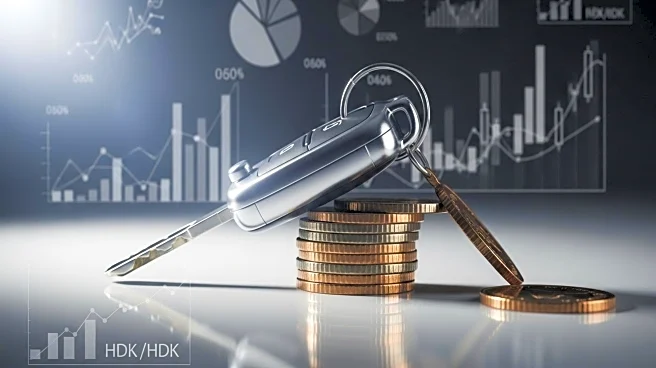What's Happening?
The rising cost of cars and insurance is pushing millions of Americans to the financial brink, with Wall Street expressing concerns that this could spark a recession akin to the 2008 financial crisis. Currently, drivers owe $1.66 trillion in car loans, surpassing federal student loan debt and credit card debt, marking a 20% increase since 2020. High inflation has further strained household budgets, leading to more missed car payments. The Consumer Federation of America has noted alarming trends in delinquencies, defaults, and repossessions, reminiscent of those seen before the Great Recession. In 2008, risky loans led to widespread economic collapse, with 3.1 million homeowners losing their homes. The current situation is exacerbated by record prices for new and used cars, along with rising insurance premiums, pushing 1.6 million drivers into repossessions last year.
Why It's Important?
The potential for a recession driven by car debt is significant, as it could impact various sectors of the U.S. economy. If consumers continue to default on car loans, it could lead to a broader economic downturn, affecting industries reliant on consumer spending. The auto industry, already facing challenges from supply chain disruptions and increased production costs, could suffer further setbacks. Additionally, financial institutions may face increased risk exposure, reminiscent of the 2008 crisis. The economic pressure on American families could lead to reduced spending in other areas, impacting retail and service sectors. The situation highlights the need for careful monitoring and potential policy interventions to prevent a repeat of past economic failures.
What's Next?
As the situation develops, stakeholders including policymakers, financial institutions, and consumer advocacy groups may need to consider measures to mitigate the risk of a recession. This could involve reassessing lending practices, implementing consumer protection policies, and exploring ways to stabilize car prices and insurance costs. The auto industry may need to adapt to changing consumer demands and economic conditions, potentially shifting towards more affordable and sustainable options. Monitoring economic indicators and consumer behavior will be crucial in predicting and preventing further economic distress.
Beyond the Headlines
The current car debt crisis underscores deeper issues within the U.S. economy, such as income inequality and the affordability of essential goods and services. It raises ethical questions about lending practices and the responsibility of financial institutions to ensure consumer protection. The long-term implications could include shifts in consumer behavior, with more Americans opting for alternative transportation methods or delaying car purchases. Additionally, the crisis may prompt discussions on the sustainability of current economic models and the need for systemic reforms.











